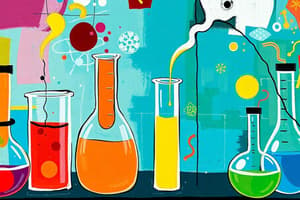Podcast
Questions and Answers
Which of the following is NOT a step in the scientific method?
Which of the following is NOT a step in the scientific method?
- Observation
- Conclusion
- Prediction
- Explanation (correct)
- Hypothesis
A scientific theory is a statement about natural phenomena that is universally accepted as fact.
A scientific theory is a statement about natural phenomena that is universally accepted as fact.
False (B)
What is the primary purpose of a scientific model?
What is the primary purpose of a scientific model?
To simplify and represent complex phenomena.
The study of living organisms and their processes is known as ______.
The study of living organisms and their processes is known as ______.
Match the branches of science with their focus:
Match the branches of science with their focus:
What is emphasized as a key feature of the scientific method?
What is emphasized as a key feature of the scientific method?
Laws in science describe how natural phenomena occur without explaining why.
Laws in science describe how natural phenomena occur without explaining why.
What is the role of data analysis in the scientific method?
What is the role of data analysis in the scientific method?
The ______ is a systematic process for acquiring knowledge and includes observation, hypothesis, and experimentation.
The ______ is a systematic process for acquiring knowledge and includes observation, hypothesis, and experimentation.
Which of the following best describes the difference between a theory and a law?
Which of the following best describes the difference between a theory and a law?
Flashcards
Scientific Method
Scientific Method
A systematic way of acquiring knowledge by testing explanations and predictions about the universe.
Observation
Observation
Identifying a phenomenon or problem.
Hypothesis
Hypothesis
A testable explanation for an observation.
Prediction
Prediction
Signup and view all the flashcards
Experiment
Experiment
Signup and view all the flashcards
Data Analysis
Data Analysis
Signup and view all the flashcards
Conclusion
Conclusion
Signup and view all the flashcards
Objectivity
Objectivity
Signup and view all the flashcards
Reproducibility
Reproducibility
Signup and view all the flashcards
Falsifiability
Falsifiability
Signup and view all the flashcards
Scientific Theory
Scientific Theory
Signup and view all the flashcards
Scientific Law
Scientific Law
Signup and view all the flashcards
Scientific Model
Scientific Model
Signup and view all the flashcards
Physics
Physics
Signup and view all the flashcards
Chemistry
Chemistry
Signup and view all the flashcards
Biology
Biology
Signup and view all the flashcards
Earth Science
Earth Science
Signup and view all the flashcards
Astronomy
Astronomy
Signup and view all the flashcards
Study Notes
Scientific Method
- Science is a systematic enterprise that builds and organizes knowledge in the form of testable explanations and predictions about the universe.
- The scientific method is a framework for acquiring knowledge.
- Key steps in the scientific method:
- Observation: Identifying a phenomenon or problem.
- Question: Formulation of a specific question about the observation.
- Hypothesis: A testable explanation for the observed phenomenon or problem.
- Prediction: A statement about what will happen if the hypothesis is correct.
- Experiment: A controlled procedure carried out to test the prediction.
- Data Analysis: Examining results of the experiment to see if they support the hypothesis.
- Conclusion: Drawing a conclusion based on if data supports or rejects the initial hypothesis.
- Key features of the scientific method include: objectivity, reproducibility, and falsifiability.
- Science is focused on understanding natural phenomena using evidence-based research.
Branches of Science
- Science is broadly categorized into various branches.
- Some major branches include:
- Physics: Study of matter, energy, and their interactions
- Chemistry: Study of the composition, structure, properties and reactions of matter.
- Biology: Study of living organisms and the processes that sustain them.
- Earth Science: Study of the Earth's physical structure, processes, history, and its position in the solar system.
- Astronomy: Study of celestial objects and phenomena.
- These branches often overlap and build upon each other.
Scientific Theories and Laws
- A scientific theory is a well-substantiated explanation of some aspect of the natural world.
- Theories are supported by a vast body of evidence and are repeatedly tested.
- Theories can change or be refined as new evidence emerges.
- Laws are concise statements about natural phenomena.
- Laws describe relationships between variables and are often expressed mathematically.
- A law describes what happens, a theory explains why it happens.
Scientific Models
- A scientific model is a simplified representation of a complex phenomenon.
- Models help scientists visualize and understand phenomena they cannot directly observe.
- Different types of models exist: physical models, conceptual models, and mathematical models.
- Models make it possible to test and refine hypotheses in simpler, controlled environments.
Scientific Communication
- Science relies on effective communication to share and validate knowledge.
- Scientists present their work through publications, presentations, and conferences.
- Peer review is essential in the scientific process as it provides an independent assessment of scientific validity and reliability.
Scientific Ethics and Integrity
- Science strives to uphold ethical standards.
- Integrity remains a cornerstone of scientific practice.
- Scientists must adhere to ethical guidelines, which include: accurate data reporting, avoidance of bias, and appropriate authorship practices.
- Misconduct, such as fraud or plagiarism, is unacceptable. Maintaining objectivity, honesty, and transparency are critical.
Studying That Suits You
Use AI to generate personalized quizzes and flashcards to suit your learning preferences.




